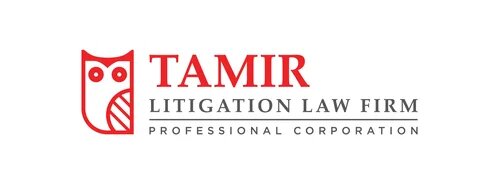Best Sexual Harassment Lawyers in Canada
Share your needs with us, get contacted by law firms.
Free. Takes 2 min.
Or refine your search by selecting a city:
List of the best lawyers in Canada
About Sexual Harassment Law in Canada
Sexual harassment in Canada is recognized as a form of discrimination that violates an individual's human rights. It encompasses any unwanted or unwelcome sexual behavior that makes someone feel uncomfortable, unsafe, or violated. The Canadian Human Rights Act and provincial human rights codes prohibit sexual harassment in various areas, including the workplace, schools, and public spaces. Notably, both federal and provincial laws apply, depending on the jurisdiction. Organizations and employers are required to create safe environments free from harassment and discrimination.
Why You May Need a Lawyer
A lawyer is typically sought in the following situations involving sexual harassment:
- If you are a victim of sexual harassment seeking to understand your rights and potential remedies.
- If you need assistance navigating the complexities of filing a complaint with appropriate government agencies or human rights tribunals.
- If you require representation in workplace harassment matters to ensure a fair hearing and potential compensation claims.
- If an employer needs guidance on implementing anti-harassment policies or defending against harassment claims.
- If you are involved in a criminal proceeding related to allegations of sexual harassment.
Local Laws Overview
Key aspects of local laws regarding sexual harassment in Canada include:
- The Canadian Human Rights Act and various provincial human rights codes, which prohibit sexual harassment as a form of discrimination.
- Employers are legally obligated to provide a work environment free from harassment and must take appropriate action when a complaint is raised.
- Comprehensive complaint mechanisms are in place through human rights commissions and labor boards.
- Victims have a right to fair compensation for damages, which can include lost wages and emotional distress compensation.
- There are criminal law measures available if the harassment amounts to a crime, such as assault or stalking.
Frequently Asked Questions
What constitutes sexual harassment in Canada?
Sexual harassment involves any unwanted or unwelcome sexual behavior, such as inappropriate touching, unsolicited remarks, lewd comments, or sexual advances, whether direct or indirect.
Where can sexual harassment occur?
Sexual harassment can occur in various settings, including workplaces, educational institutions, public spaces, and within professional-client relationships.
What should I do if I experience sexual harassment at work?
You should report the behavior to a manager or human resources department as soon as possible. Document the instances of harassment and consider reaching out to a lawyer to explore further actions.
What legal options are available to victims of sexual harassment?
Victims can file a complaint with the relevant human rights tribunal, pursue a civil lawsuit for damages, or address the matter through internal complaint processes if applicable.
How can an employer ensure a harassment-free workplace?
Employers should implement and enforce proper anti-harassment policies, provide training for all employees, and establish clear reporting and investigation procedures for harassment complaints.
Are there any time limitations for filing a complaint?
Yes, there are time limits to file complaints, often within six months of the incident. It is important to check the specific deadlines with local human rights commissions.
Can I claim for damages in a harassment case?
Yes, victims may be entitled to claim for damages, which can cover lost wages, emotional trauma, legal fees, and other related costs.
What if the harassment is not reported at the time of the incident?
It is recommended to report harassment as soon as it occurs, but victims may still have legal recourse later, depending on the circumstances and any documented impact.
Can observers of harassment take action?
Observers can play a crucial role by supporting the victim and reporting the incident through appropriate channels within the organization or external bodies.
Is mediation available as an option in harassment cases?
Mediation can be an option where both parties are open to negotiation, guided by a neutral third party to resolve issues amicably before legal or tribunal engagements.
Additional Resources
For more information and support, consider reaching out to the following resources:
- Canadian Human Rights Commission: Offers guidance on human rights, including handling harassment cases.
- Provincial Human Rights Commissions: Each province has its own body for handling complaints and offering support.
- Legal Aid Services: Provides legal representation for those who might not afford it privately.
- Non-Governmental Organizations: Organizations like the Canadian Women's Foundation offer resources and support for victims.
Next Steps
If you need legal assistance for a sexual harassment issue, consider these steps:
- Document all relevant details of the harassment incident(s), including times, dates, witnesses, and any communication involved.
- Reach out to a legal professional with expertise in sexual harassment cases for a consultation to explore your legal options and rights.
- Contact your local human rights commission or tribunal to learn about filing a complaint and the processes involved.
- If after-hours or immediate assistance is required, consider reaching out to local support hotlines or resource centers specializing in harassment support.
Lawzana helps you find the best lawyers and law firms in Canada through a curated and pre-screened list of qualified legal professionals. Our platform offers rankings and detailed profiles of attorneys and law firms, allowing you to compare based on practice areas, including Sexual Harassment, experience, and client feedback.
Each profile includes a description of the firm's areas of practice, client reviews, team members and partners, year of establishment, spoken languages, office locations, contact information, social media presence, and any published articles or resources. Most firms on our platform speak English and are experienced in both local and international legal matters.
Get a quote from top-rated law firms in Canada — quickly, securely, and without unnecessary hassle.
Disclaimer:
The information provided on this page is for general informational purposes only and does not constitute legal advice. While we strive to ensure the accuracy and relevance of the content, legal information may change over time, and interpretations of the law can vary. You should always consult with a qualified legal professional for advice specific to your situation.
We disclaim all liability for actions taken or not taken based on the content of this page. If you believe any information is incorrect or outdated, please contact us, and we will review and update it where appropriate.
Browse sexual harassment law firms by city in Canada
Refine your search by selecting a city.
















